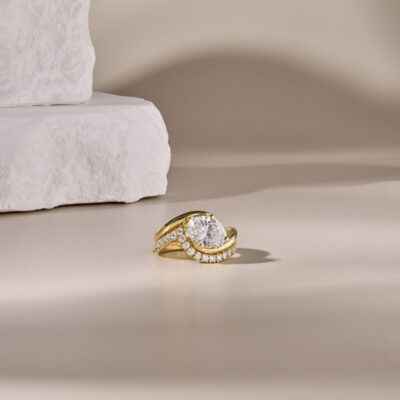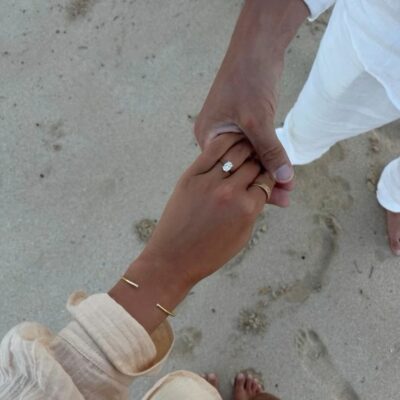
Mariah Carey’s recent engagement to James Packer made headlines worldwide, not least because of the 35-carat whopper of a diamond ring she received. But, even if your budget doesn’t quite stretch to a ring like Mariah’s, wedding and engagement ring shopping is likely to be of the most expensive purchases you’ll make in your lifetime, so it’s worth doing your research.
But where to begin? For many couples, wedding ring shopping can prove to be a steep learning curve, punctuated with visits to lots of jewellers – and a lot of Googling.
However, with the help of British-born, Brisbane-based master jeweller and diamond merchant Nick Ireland, here are some shortcuts that will ensure you get the most bang for your hard-earned buck.
Since moving to Australia 26 years ago, Nick has built a respected name for himself and his company, the Diamond Jewellery Studio, which specialises in pink diamonds and hand-made rings that are more like works of art than mere pieces of jewellery.
One of Nick’s top tips is to approach ring shopping with a level, considered head, much like you would when buying a house.
“Of course, it’s an exciting time for both the bride-to-be and her fiance, but don’t let the romance of it cloud your judgment,” he advises.
“It’s also worth establishing a budget before you start looking. Ultimately, you need to know what you want to spend, because there are so many different stones and styles available,” says Nick who created a stunning diamond engagement ring for his wife using a TripleEx H&A centre diamond with two heart-shaped diamonds either side.
“If you can give your jeweller a budget, they will give you some realistic options as to what you can achieve within that budget.”
Now, with your sensible hat firmly in place, here are six questions Nick says all prospective wedding and engagement ring buyers should ask:
Do you have a ring that fits within my budget?
There’s no point falling in love with a ring you simply cannot afford or, for that matter, wasting your dollars when your price range could have stretched to a superior product. Nick, who has sold hundreds of wedding and engagement rings in his nearly three decades as a jeweller, says it’s always a good idea to ring your jeweller before stepping foot in a jewellery store’s door to discuss their range and your budget.
“That way, you won’t be wasting your precious time – and won’t be disappointed or, perhaps, even embarrased when you’re face-to-face with a jeweller.”
What manufacturing technique do you use to make your rings?
Many novice ring buyers may not realise that the methods and techniques used by small and large jewellery companies can vary greatly.
Some use computer-aided design (CAD) software to design the rings and then commercial printing and manufacturing processes to cast their jewellery. Other jewellers, including Nick, sketch their designs by hand and offer only hand-made rings.
Others still offer a mix of both techniques.
While hand-made rings, typically, cost about double the price or a ring manufactured on a large scale, it’s worth understanding the process and considering your options. “Of course,” says Nick, “while jewellery manufactured en mass can be exquisite, there’s nothing quite like a one-of-a-kind, handmade ring that nobody else in the world owns!”
Does your diamond come with certification?
If you’re spending a small fortune on your tiny, shimmering piece of rock, you want to know you’re getting the real thing. ‘
“The synthetic market has moved in leaps and bounds in the last five years,” says NIck, “and you need an incredibly expensive machine to understand if a stone is real.”
While some couples won’t mind a synthetic ring, others absolutely do, he adds.
“So, ask about certification and ask what laboratory certified your diamond,” he adds.
While there are a range of laboratories that certify diamonds, the Gemological Institute of America is the most popular and well regarded.
“On the online portal that I use that tracks the global supply of stones, at any given time there is between $8 and $9 billion worth of stones on there, and 90% are certified by the GIA,’ Nick says.
When it comes to particularly niche diamonds like the Argyle Pink Diamonds, they may come with their own certification or letter of authenticity. If you’re unsure of a certification, it’s worth doing a little research to check its validity.
Where was the diamond mined and how do I know it was ethically sourced?
The increase in stories about blood diamonds has raised awareness globally of how some diamonds are sourced and, says Nick, many of his customers are quick in asking about how they can avoid purchasing “unethical diamonds.”
“Don’t be afraid to ask your jeweller about the origin of their stones,” says Nick. “If a stone comes from Australia or Canada, you can, generally, be assured that the labour used to source the stone was ethical.
“When it comes to diamonds sourced in other parts of the world, ask whether the jeweller’s stones were mined using the Kimberley Process,” suggests Nick, “That is a process designed and overseen by the United Nations in an effort to prevent conflict diamonds entering the mainstream diamond market.”
What are the diamond’s four Cs?
Nick suggests being familiar with the four Cs of diamond buying: carat, colour, clarity and cut – as one holistic investigation because, quite often, buyers end up having to weigh up their options and, perhaps, sacrifice one or more of the four Cs in order to get something they truly love that won’t blow their budget.
“Not everyone can afford a 1-carat diamond that has flawless clarity,” says Nick, “the highest colour grade (D) and a Triple Excellent cut.”
Most buyers make some compromises along the way, in order to get the best stone in their price range.
“In my experience, big is good, every customer seems to want big,’ says Nick, whose most popular ring is a simple six-claw solitaire with a large round brilliant diamond. “Most buyers want the biggest size their budget will allow for, with a clarity that is acceptable to them, and lastly a good cut.
“Actually,” says Nick, “cut is everything. Cut is more important than anything else.”
For example, he says, “I could show you a 1-carat solitaire that is $30,000 and you could buy another 1-carat diamond on the market for $3000. The difference is that the $30,000 diamond will have been cut perfectly.”
Does the final product come with a third-party valuation before you walk out the door?
Some jewellers, including Nick’s Diamond Jewellery Studio, offer clients a third-party valuation that will give you that extra little peace of mind that you’re getting what you pay for.
Some stores also provide third-party insurance so you’re covered from the moment you and your shiny new ring walk out the door.
“Your wedding or your engagement ring is one of the most special and significant items you’ll ever own,” says Nick, “but shopping for it with your fiance is also one of life’s most memorable moments, so do your research and, not only will you buy something worthy of your hard-earned money, you’ll have a truly lovely – and fun – time doing so!”
 The art of pairing your wedding band and ring
The art of pairing your wedding band and ring  Top 6 engagement ring trends for 2025
Top 6 engagement ring trends for 2025  Engagement ring buzz: fact or fiction
Engagement ring buzz: fact or fiction